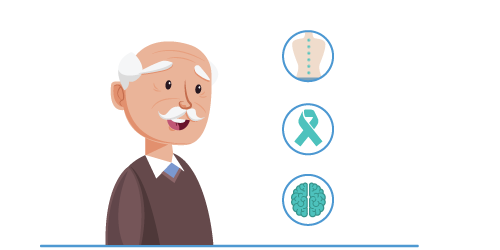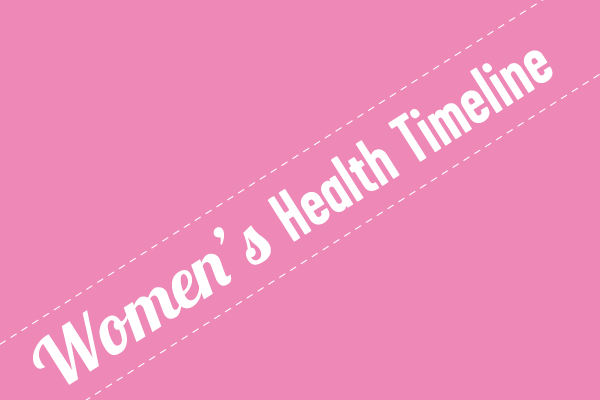Men's Health Timeline
It’s estimated that men visit their GP half as much as women. So with men much more likely to ignore their health, what changes should they be looking out for as they age?


Men in their 20s and 30s
Decisions made and actions taken during this time can have a very real effect on men’s health in later life. What to look out for:
- Testicular Cancer: Regularly check for lumps and visit the GP if you find anything. The earlier testicular cancer is found, the more effective the treatment.
- Skin Cancer: Use a high protection SPF that blocks UVA and UVB rays, and examine your skin for abnormalities.
- Sexual Health: Take precautions and get tested in order to prevent STIs like gonorrhoea, chlamydia, syphilis and HIV.
- Mental Health: Care for your mental health. Don’t ignore the pressures brought about by your first ‘real’ job, financial independence, and increased responsibilities.
- Weight: Start good eating and exercise habits early. Being obese or overweight increases a person’s risk of developing medical conditions like diabetes, arthritis or heart disease.


Men in their 40s and 50s
Maintaining a healthy work-life balance is fundamental to staying well both mentally and physically, while going easy on the alcohol and not smoking will help keep you fighting fit. What to look out for:
- Erectile dysfunction: The underlying causes of erectile dysfunction can point to more serious health problems such as type 2 diabetes, hypertension or high blood pressure.
- Prostate cancer: The most common cancer in men, prostate cancer is very treatable and, if found early, completely curable. Any concerns should be quickly directed to your GP.
- Heart health: Heart attacks are more common in men in their 50s. Any chest pain or tightness, abnormal heartbeats, or shortness of breath should mean an immediate visit to the GP.
- Blood pressure: Get your blood pressure tested regularly. Once men hit 45, the risk of high blood pressure starts to increase. This can lead to serious health problems.


Men in their 60s and Beyond
Healthy choices made earlier in life come into play once you hit 60. Getting older means the risk of developing certain serious illnesses increases; heart attack, stroke, cancers, arthritis and type 2 diabetes are more prevalent in older men. What to look out for:
- Osteoporosis: Back pain, less energy, impaired mobility and loss of height are symptoms of osteoporosis in men. Often considered a women’s illness, osteoporosis usually isn’t diagnosed in men until they suffer multiple fractures.
- Cancer: Get screened for cancers periodically. The average age for men to get prostate cancer is between ages 65 and 69. Many other types of cancer also become more prevalent among men in this age group.
- Dementia: Dementia affects a person’s thinking, memory, concentration and perception. Certain drugs and treatments can help people in the early stages of dementia, so a proper assessment from a specialist is crucial.
Webdoctor.ie treats men of any age. To speak with an Irish-registered GP today, book a video consultation online.




